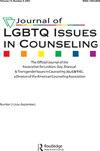The Moderating Effect of Internalized Transphobia on the Association Between Gender Congruence and Sexual Satisfaction for Transgender Men
IF 1.1
Q2 Social Sciences
引用次数: 1
Abstract
Abstract Despite the population of transgender individuals in the United States doubling from 2011 to 2016, this population is one of the most understudied in counseling and related disciplines. Of the available research, the associations between gender congruence, defined as an individual’s body matching their gender identity, and well-being have been examined, particularly demonstrating positive associations between gender congruence and overall life satisfaction. However, a dearth of research remains on the possible associations between gender congruence and indices of relationship well-being—particularly sexual satisfaction—and possible moderating effects of the internal negative feelings regarding one’s identity (internalized transphobia). To address these gaps in the literature, this study gathered self-report data from 165 binary transgender men. While there was not an effect of gender congruence on sexual satisfaction, internalized transphobia was found to moderate this association; individuals who reported high internalized transphobia and high gender congruence reported the highest sexual satisfaction. Results of this study highlight the existing literature on the negative associations between internalized transphobia and well-being for transgender individuals. Implications for counselors are discussed, including advocacy efforts and implementation of techniques to facilitate growth and resilience to help transgender clients navigate the negative effects of internalized transphobia.内化跨性别恐惧症对跨性别男性性别一致性与性满足关系的调节作用
尽管从2011年到2016年,美国的跨性别人群翻了一番,但这一人群是咨询及相关学科中研究最不足的群体之一。在现有的研究中,性别一致性(定义为个人的身体与其性别认同相匹配)与幸福感之间的关系已经得到了检验,尤其是性别一致性与总体生活满意度之间的积极联系。然而,关于性别一致性和关系幸福指数(尤其是性满意度)之间可能存在的联系,以及关于个人身份的内在负面情绪(内化变性恐惧症)可能产生的调节作用的研究仍然缺乏。为了解决文献中的这些空白,本研究收集了165名二元跨性别男性的自我报告数据。虽然性别一致性对性满意度没有影响,但内化的变性恐惧症缓和了这种关联;内化变性恐惧症高和性别一致性高的个体性满意度最高。本研究的结果强调了现有文献关于内化变性恐惧症与跨性别个体幸福感之间的负相关。对咨询师的启示进行了讨论,包括宣传工作和技术的实施,以促进成长和弹性,以帮助跨性别客户驾驭内化的变性恐惧症的负面影响。
本文章由计算机程序翻译,如有差异,请以英文原文为准。
求助全文
约1分钟内获得全文
求助全文

 求助内容:
求助内容: 应助结果提醒方式:
应助结果提醒方式:


